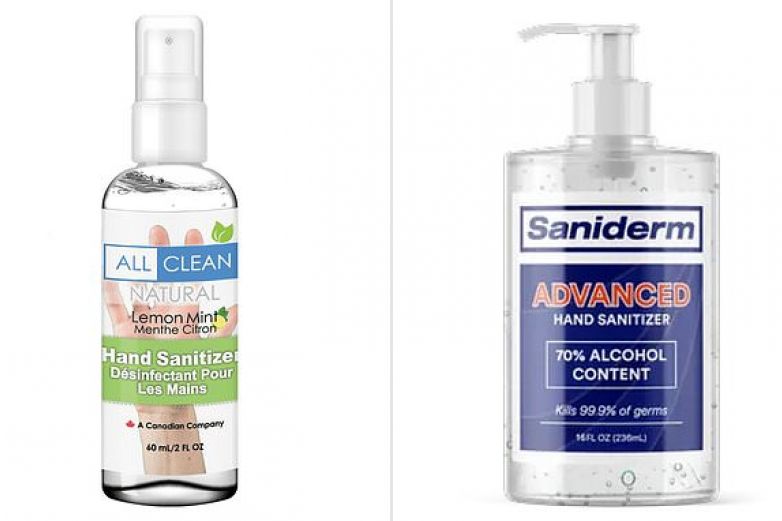Here are 9 hand sanitizers that the FDA warns can be toxic if absorbed by the body

The FDA issued a warning about sanitizers manufactured by Eskbiochem SA de CV in Mexico
he Food and Drug Administration over the weekend issued a warning on nine alcohol-based hand sanitizers manufactured by Eskbiochem SA de CV in Mexico that it says contain wood methanol, a toxic substance that could ultimately result in death of absorbed through the skin or ingested.
“Consumers who have been exposed to hand sanitizer containing methanol should seek immediate treatment, which is critical for a potential reversal of toxic effects of methanol poisoning,” the FDA wrote on June 19.
“Substantial methanol exposure can result in nausea, vomiting, headache, blurred vision, permanent blindness, seizures, coma, permanent damage to the nervous system or death,” the report indicated. The agency said the risk of possible ingestion centered mostly on young children or adolescents who might use alcohol-based sanitizers as a substitute for grain alcohol.

Here are a list of the hand sanitizers manufactured by Eskbiochem:
- All-Clean Hand Sanitizer (NDC: 74589-002-01)
- Esk Biochem Hand Sanitizer (NDC: 1)
- CleanCare NoGerm Advanced Hand Sanitizer 75% Alcohol (NDC: 74589-008-04)
- The Good Gel Antibacterial Gel Hand Sanitizer (NDC: 74589-010-10)
- CleanCare NoGerm Advanced Hand Sanitizer 80% Alcohol (NDC: 74589-005-03)
- CleanCare NoGerm Advanced Hand Sanitizer 75% Alcohol (NDC: 74589-009-01)
- CleanCare NoGerm Advanced Hand Sanitizer 80% Alcohol (NDC: 74589-003-01)
- Saniderm Advanced Hand Sanitizer (NDC: 74589-001-01)
- Lavar 70 Gel Hand Sanitizer

The FDA warnings come as the coronavirus crisis has ramped up demand for hand sanitizer across the globe. At the height of the pandemic in March, a number of retailers, including Costco Wholesale Corp. BJ’s Wholesale Club Holdings Inc. and Kroger Co. reported surging sales in hand-cleaning products and other sanitizing merchandise. In the week ending April 25, Nielsen said hand sanitizer saw the highest in-store week-over-week growth.

Individuals have even taken to attempting to make their own hand sanitizer; however, the U.S. Centers for Disease Control and Prevention has said that washing hands with plain soap and water is the best way to kill the novel strain of coronavirus that causes COVID-19.
Moreover, hand sanitizer requires at least 60% alcohol. Alcohol dissolves the lipid membrane and disrupts other supramolecular interactions in viruses but you need a fairly high concentration of the alcohol to get a rapid dissolution of the virus. Vodka or whiskey — usually 40% ethanol — won’t dissolve the virus as quickly. “Overall, alcohol is not as good as soap at this task,” wrote Palli Thordarson, a professor at the School of Chemistry at the University of South Wales, Sydney in a column for MarketWatch in April.

Consumers who have been exposed to hand sanitizer containing methanol should seek immediate treatment, which is critical for potential reversal of toxic effects of methanol poisoning. Substantial methanol exposure can result in nausea, vomiting, headache, blurred vision, permanent blindness, seizures, coma, permanent damage to the nervous system or death. Although all persons using these products on their hands are at risk, young children who accidently ingest these products and adolescents and adults who drink these products as an alcohol (ethanol) substitute, are most at risk for methanol poisoning.
On June 17, 2020, FDA contacted Eskbiochem to recommend the company remove its hand sanitizer products from the market due to the risks associated with methanol poisoning. To date, the company has not taken action to remove these potentially dangerous products from the market. Therefore, FDA recommends consumers stop using these hand sanitizers and dispose of them immediately in appropriate hazardous waste containers. Do not flush or pour these products down the drain.
FDA reminds consumers to wash their hands often with soap and water for at least 20 seconds, especially after going to the bathroom; before eating; and after coughing, sneezing, or blowing one’s nose. If soap and water are not readily available, the Centers for Disease Control and Prevention (CDC) recommend consumers use an alcohol-based hand sanitizer that contains at least 60 percent ethanol.
FDA remains vigilant and will continue to take action when quality issues arise with hand sanitizers. Additionally, the agency is concerned with false and misleading claims for hand sanitizers, for example that they can provide prolonged protection such as 24-hours against viruses including COVID-19, since there is no evidence to support these claims.
To date, FDA is not aware of any reports of adverse events associated with these hand sanitizer products. FDA encourages health care professionals, consumers and patients to report adverse events or quality problems experienced with the use of hand sanitizers to FDA’s MedWatch Adverse Event Reporting program:
- Complete and submit the report online; or
- Download and complete the form, then submit it via fax at 1-800-FDA-0178.
“While everyone who uses these products on their hands is at risk,” the FDA said children who accidentally ingest it or an adult who drinks it as a substitute for ethyl alcohol are also at risk.
The methanol is a toxic cousin ethyl alcohol containing standard alcoholic drinks, and can not be distinguished by their odor or taste. It causes organ and brain damage, and can be fatal. Its symptoms include chest pain, nausea, hyperventilation, blindness, and even a coma.
Methanol deaths in Mexico
Methanol poisoning from ingesting adulterated spirits has caused more than 100 deaths in Mexico since the coronavirus pandemic began
Source: fda.gov, milenio.com, ndclist.com





